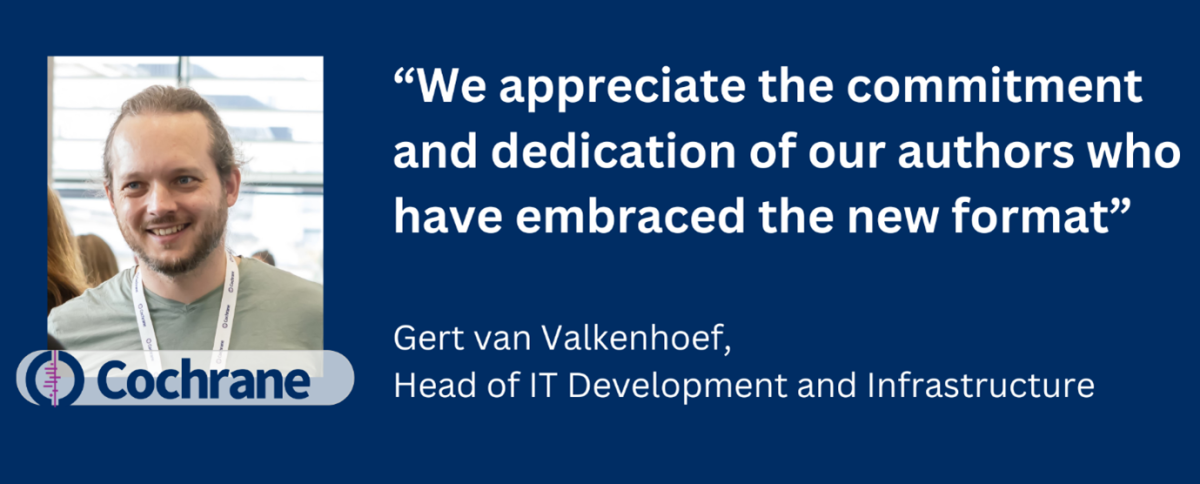
The first Cochrane intervention review in the new format has made its debut on the Cochrane Library, offering a more streamlined, user-friendly experience for readers and researchers. The review, Anti-vascular endothelial growth factor biosimilars for neovascular age-related macular degeneration by Tomiko Sunaga and colleagues, is an excellent example of the kind of review that can now be achieved.

"This is a significant moment after a lot of hard work behind the scenes. Cochrane has taken a big leap into the future of open science and health research publishing," says Ella Flemyng, Head of Editorial Policy, and Research Integrity. "With the new format, we are breaking down barriers to access and usability, making things more streamlined for our authors and putting power back in the hands of our users who can now navigate and understand our reviews more easily."
“This is a significant moment after a lot of hard work behind the scenes”
Over thirty years ago, Cochrane began with the goal of making vital evidence widely available. Starting with reviews on pregnancy and childbirth and laying the foundation for what would become the Cochrane Collaboration. Our mission has always been to make evidence both accessible and usable and - through continuous growth and dedication to research integrity - Cochrane has become an essential resource for health professionals worldwide.
The new format, which launched in August 2023, aims to simplify the review process and the improve author experience while preserving the high standards Cochrane is known for. The publication of this review marks a significant milestone in a period of huge change as Cochrane focuses on developing new structures and tools and improving processes to ensure it remains viable, sustainable, and focused on major global health challenges long into the future.
We've streamlined our review process, allowing authors to produce sharper, more focused reviews efficiently. Moving towards FAIR principles ensures that our data is findable, accessible, interoperable, and reusable, paving the way for more collaboration and less wasted research.
"We appreciate the commitment and dedication of our authors who have embraced the new format," Gert van Valkenhoef, Head of IT Development and Infrastructure explains. "We know that change can be daunting, but this transformation aims to simplify the process for our authors while enhancing the experience for our users. I’m grateful that our authors have understood that and worked with us as we’ve made these fairly significant changes to the old way of doing things.”

The overall satisfaction ratings of authors have significantly improved from favourable in 2022 to excellent in 2024, as demonstrated by a recent Cochrane community survey. Through these improvements, Cochrane continues to ensure that users can access and use trustworthy synthesized evidence to make informed decisions.
This first published review of many is a sign of Cochrane moving positively towards the future with more changes planned and a new scientific strategy being launched later in the year.
For more information you can:
- Read the full Anti-vascular endothelial growth factor biosimilars for neovascular age-related macular degeneration review
- Read more about the history and impact of changes to the review format
- Find out more about the changes taking place, visit our Future Cochrane website.
